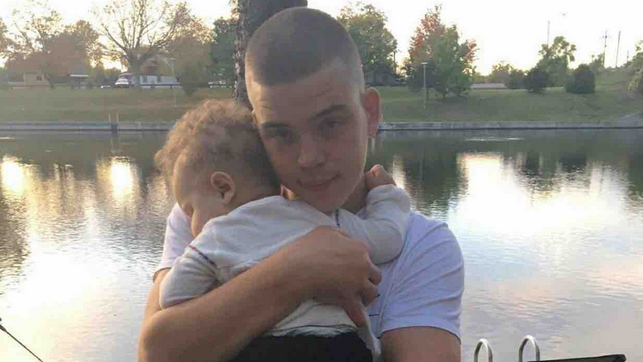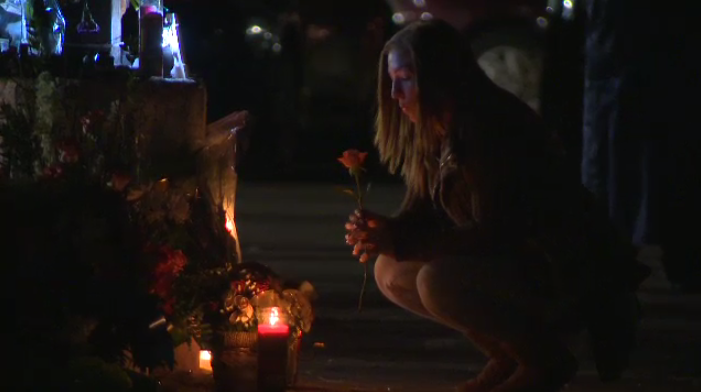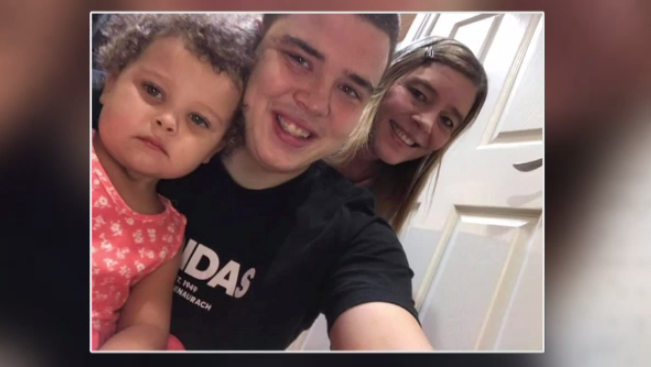Fighting for change: Bradley Pogue’s mother petitions for parole reform
 Bradley Pogue in an undated photo.
Bradley Pogue in an undated photo.
This is the first of a three-part series looking at crime, the lingering effects of that trauma and what families are doing to try to change Canada’s justice system. The mothers of Bradley Pogue and Jeffrey Maxner share their heartbreaking stories and, in part three, we’ll look at the criteria the parole board considers before granting parole to offenders.
“This is my legacy now,” Hayley Schultz says over the phone. “My legacy is to fight for justice.”
A calling that stems from the tragic death of her 24-year-old son, Bradley Pogue, who was fatally shot at a Cambridge, Ont. plaza in 2018.
The tragedy has haunted Schultz – and her family – for the last five years.
“It still feels like yesterday that he was murdered,” she says. “I can still remember that phone call like it was five seconds ago.”
Schultz has tried to come to terms with her son’s death, even though she knows no answer will ever be enough.
“It’s all so very sad, so very wrong and also senseless. It was all taken for nothing.”
Schultz says Canada’s justice system has failed families, so she’s turned her heartbreak into action and launched a petition to change parole and prison requirements – a message that the community and other victims of violent crime are getting behind.
Remembering Bradley
Schultz describes Pogue as “extremely compassionate, feisty, relentless, brave [and a] fearless protector.”
“He was so gentle with his daughter,” she recalls. “He was so tough with his brothers. He was so protective of his mother. He was so feisty with his friends. If he got something in his mind, he was relentless to do it.”
Schultz remembers Pogue sitting up all night with his friends “just talking them through some of their issues.”
She says she had a close relations with her son.
“He loved his mom’s shepherd’s pie,” Schultz explains. “We would FaceTime for five hours while he was cooking a turkey. He would call me 30 times a day, and that’s not exaggerating.”
 Bradley Pogue with his mother Hayley Schultz in an undated photo.
Bradley Pogue with his mother Hayley Schultz in an undated photo.
Pogue had gotten into trouble during his teens, but his mother says her son was making positive changes in his life.
“He was molding himself into a wonderful man and it was taken for nothing,” Schultz laments. “It was taken over a bag of weed.”
The day Bradley died
Pogue wouldn’t have died if he hadn’t answered a message from Adam De-Gannes on Nov. 19, 2018.
De-Gannes had been selling opioids to support his drug habit, but some of his customers were unhappy with the quality of the drugs he sold them. He also owed money to several people, including PeterBouctsis. De-Gannes agreed to set up a drug deal so Bouctsis could rob the seller of marijuana.
“They tried to call four other people to rip off before Bradley. They were just calling anybody, it wasn’t Bradley specific,” Schultz explains. “There’s four other moms that could be sitting in my position right now.”
The trio agreed to meet at Brierdale Plaza in Cambridge.
But Pogue’s brother felt something was off and he tried to stop him from meeting with De-Gannes.
“Codi said: ‘Bradley, I’ve got a bad feeling about this. Something’s not right. Why would Adam [De-Gannes] call you out of the blue when he could go buy weed anywhere?’” Schultz recalls. “Codi’s gut instinct was right.”
The brothers ended up going to the meeting together.
Surveillance video, which was later shown at trial, showed Pogue, his brother Codi, De-Gannes and Bouctsis entering a local pizza shop. Pogue, De-Gannes and Bouctsis then go outside together and not long after, Codi joins them.
In court, the defence lawyer asked Codi: “You’re not concerned [at this point]?”
“I didn’t think my brother would get shot in the head,” he testified.
Schultz explains what happened next as “fight, flight or freeze.” When Bouctsis pulled out a gun, she says Codi froze and De-Gannes fled.
“Brad died protecting Codi,” Schultz adds. “He died instantly on the spot. He died in his brother’s arms.”
 Police at Brierdale Plaza in Cambridge on the night Bradley Pogue died.
Police at Brierdale Plaza in Cambridge on the night Bradley Pogue died.
She later heard her son’s call to 911.
“My son Codi screaming: ‘My mom’s going to freak, my mom’s going to freak. You guys gotta get here now,’” she recalls. “That’s something I will never get out of my head, ever. Just sheer fear in his voice.”
Criminal cases
De-Gannes was initially charged with second-degree murder. He later pled guilty to manslaughter and was sentenced to six years behind bars for his part in Pogue’s death. He’s since been released from prison, but hasn’t stayed out of trouble. He’s currently in police custody and facing unrelated robbery charges.
Bouctsis, the man who pulled the trigger, was eventually found guilty of second-degree murder and sentenced to life in prison with no chance of parole for seven years. Due to the Youth Criminal Justice Act, Bouctsis was only publicly identified once his sentence was handed down.
Dealing with grief
The years that followed Pogue’s death were difficult for both his family and friends.
“It’s been five and a half years, I still cry every day missing him,” Schultz says. “Watching my granddaughter grow up without her dad, it’s all so sad.”
Pogue’s daughter, whom CTV News has chosen not to name, will turn eight in May and is surrounded by a loving family who has made her protection their priority.
 Bradley Pogue in an undated photo.
Bradley Pogue in an undated photo.
“She’s amazing,” gushes Schultz. “The most happiest and protected. She doesn’t know evil in the world. When somebody says [she] doesn’t have a daddy, she’s very loud and says: ‘Yes, I do. My daddy’s an angel.’ She knows a bad man did something to her daddy, but she knows nothing about it.”
Pogue’s friends, meanwhile, have also kept in touch with Schultz. She says they still reach out to share memories of her son.
“The magnitude of what Bradley meant to other people, I will never fully understand as his mom. His friends, still to this day, call me crying. I’m so very close with all of them.”
 Someone leaves a rose at the candlelight vigil held for Bradley Pogue.
Someone leaves a rose at the candlelight vigil held for Bradley Pogue.
Even happy milestones, however, bring up bad memories for Schultz.
“I don’t celebrate my birthday anymore because Peter [Bouctsis’] birthday is the same day as mine,” she explains. “It’s awful… a sick joke.”
In lieu of celebrating, Schultz makes a point to do something good in the community.
“Same with Bradley’s [birthday]. I’ll go and give a homeless person a pair of shoes or something. Bradley always got a new pair of shoes for his birthday.”
It’s not just birthdays that are hard for Schultz, it’s also the small things.
She says she’s still struggling with post-traumatic stress disorder (PTSD).
“I’ve been off work for three solid years now. I haven’t been able to go back to work because of what they’ve done to me,” she explains. “I am terrified of society. If you can just walk to the store to go be with a friend and be murdered, I do not trust this world at all. I don’t trust people. Pretty much the only time I go outside is if I’m advocating or fighting for justice.”
Changing the system
Pogue’s death, the fight for justice and the emotional toll of it all weighs heavily on Schultz and her family.
“We’re dragged through courts for two separate appeals, we’re dragged through courts for two separate trials, we’re dragged through courts [for] anything to do with [Bouctsis]. We’re dragged through the courts every single time that there’s a new charge with them,” she explains. “It just triggers everything. They’ve been allowed to victimize another family.”
Her experience has also changed her view of Canadian law.
“[Criminals] have all the rights, we have none,” Schultz says. “I think what keeps me going every day is the fight for justice for Brad and for all Canadians that are entangled in this awful justice system and have no rights.”
Bouctsis, who was a teen at the time of Pogue’s murder, was found guilty of second-degree murder and sentenced to life in prison with no chance of parole for seven years, dating back to his arrest in 2018. He’ll be eligible for parole in November 2025 – a prospect Schultz finds disturbing.
“[He] needs to be held accountable.”
She’s launched a petition asking for the minimum parole eligibility be raised from seven to 10 years for Bouctsis and all other young offenders who have been sentenced as an adult for second-degree murder.
The second part of her petition was inspired by Bouctsis’ criminal record before and after Pogue’s murder.
At his trial, the judge noted Bouctsis demonstrated troubling behaviour behind bars. Not only did he continue to use and deal drugs, but he was also charged with three additional offences while in custody. Two were related to assaults he was allegedly involved with in May 2020 and July 2021, while the third was a bribery charge from September 2022. During sentencing, the judge described Bouctsis as “unable to control his draw to the criminal lifestyle.”
Schultz’s petition further requests that “all repeat offenders 17 years of age and older, guilty of indictable firearms offences and/or murder charges be transferred to a provincial/federal institution on their 18th birthday while awaiting [sentencing].”
“If we don’t fight, if we don’t make these changes, if we don’t sign this petition to try to make change, whether we get the change or not, it’s that we’re trying,” Schultz explains. “What I’m doing is helping me, fighting for justice and for change, not only for my situation, but for other Canadians that maybe are not strong enough, or just don’t know how to start. I’m just one mom trying to start this myself.”
She has one request for anyone touched by her story.
“Please just click on the link to sign the petition,” she asks. “Change can’t happen unless we stand up and fight for that change.”
 Bradley Pogue (centre) holding his daughter, alongside his mother Hayley Schultz. (Courtesy: Hayley Schultz)
Bradley Pogue (centre) holding his daughter, alongside his mother Hayley Schultz. (Courtesy: Hayley Schultz)
Schultz is also working with families going through a similar heartbreak, who might be unprepared for the path that lies ahead.
“My goal is just to support and help, where I can, other people that are [going] down this awful journey because it’s a tough one.”
She’s currently working with a Cambridge woman whose loved one was also murdered.
“I’m supporting her with her victim impact statements and the process of the courts, things like that,” Schultz explains. “Maybe this is my area, where I’m going to stay focused. Advocating for people and fighting for change… all in memory of Bradley.”
If you are struggling after experiencing a loss, please reach out to a local support group. You can also find additional information on the following websites:
CTVNews.ca Top Stories

Canada closes 'flagpoling' loophole for temporary visa holders
Temporary residents of Canada will no longer be able to utilise the flagpoling process to initiate work or study permits, following a ban from the Canada Border Services Agency.
Kieran Culkin, 'Shōgun,' Ali Wong win at Golden Globes
The Golden Globes, which host Nikki Glaser introduced as “Ozempic's biggest night,” got underway Sunday with awards spread around for “Emilia Pérez," “A Real Pain," and “Conclave," as Hollywood's thus-far unpredictable awards season remained hard to pin in the early going.
Driver who entered Canada 'without stopping' at B.C. border crossing arrested: police
A man who illegally blew through the Canada-U.S. border crossing in Surrey, B.C., Sunday morning has been arrested, according to authorities.
'Absolutely devastating': Southern Manitoba golf course clubhouse burns for second time in 4 years
A golf course clubhouse in Morden, Man. went up in flames Sunday for the second time in less than four years, and mere days after its reopening from the previous fire was celebrated.
Thousands are without power due to winter storm hitting Newfoundland and Labrador
Massive waves slammed Newfoundland and Labrador's coastline on Sunday, as a powerful winter storm left thousands without power.
Man responsible for New Year's truck attack previously visited New Orleans, Ontario, Egypt: FBI
The man responsible for the truck attack in New Orleans on New Year's Day that killed 14 people visited the city twice before and recorded video of the French Quarter with hands-free glasses, an FBI official said Sunday.
The Vivienne, star of 'RuPaul's Drag Race UK', dies at 32
British reality show 'RuPaul's Drag Race UK' winner James Lee Williams, aged 32, popularly known as The Vivienne, has died.
Driving into Manhattan? That'll cost you, as new congestion toll starts Sunday
New York’s new toll for drivers entering the center of Manhattan debuted Sunday, meaning many people will pay US$9 to access its busiest part in peak hours.
WATCH Woman critically injured in explosive Ottawa crash caught on camera
Dashcam footage sent to CTV News shows a vehicle travelling at a high rate of speed in the wrong direction before striking and damaging a hydro pole.

































